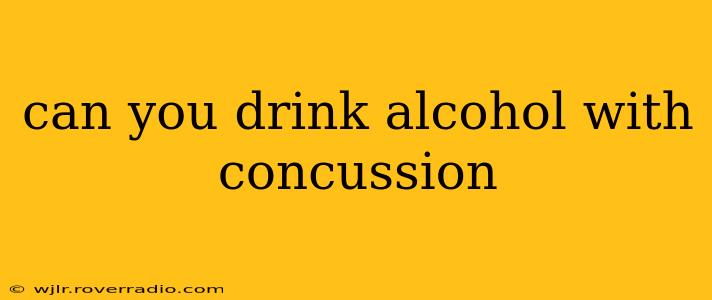Can You Drink Alcohol With a Concussion? A Definitive No.
The short answer is a resounding no. Drinking alcohol after a concussion is strongly discouraged and can significantly worsen your recovery and potentially lead to serious long-term consequences. This isn't just a suggestion; it's crucial for your health and well-being.
A concussion, or mild traumatic brain injury (mTBI), is a complex injury that disrupts the normal functioning of your brain. Your brain is already working overtime to heal itself after a concussion, and introducing alcohol only adds further stress and complications. Alcohol is a depressant, meaning it slows down brain activity. This can interfere with the brain's natural healing process and prolong recovery time.
Here's a breakdown of why you should absolutely avoid alcohol after a concussion:
What Happens When You Mix Alcohol and a Concussion?
-
Increased Swelling: Alcohol can increase inflammation and swelling in the brain, exacerbating the effects of the concussion. This swelling can put pressure on the brain, leading to further damage and complications.
-
Delayed Healing: Alcohol interferes with the body's ability to repair damaged cells and tissues, slowing down the natural healing process of the brain. This can lead to a longer recovery period and increased risk of long-term problems.
-
Exacerbated Symptoms: Alcohol can worsen common concussion symptoms, such as headaches, dizziness, nausea, vomiting, confusion, and memory problems. It can also increase fatigue and irritability.
-
Increased Risk of Secondary Injuries: Impaired judgment and coordination caused by alcohol consumption can increase the risk of secondary injuries, such as falls or accidents, which can further damage the brain.
-
Mask Symptoms: Alcohol can temporarily mask concussion symptoms, making it difficult to accurately assess your recovery progress and potentially leading to a delay in seeking appropriate medical care.
How Long Should You Avoid Alcohol After a Concussion?
There's no single definitive timeframe for how long you should abstain from alcohol after a concussion. It depends on the severity of the injury and individual recovery progress. However, it's generally recommended to avoid alcohol completely until you have fully recovered from your concussion, as determined by your doctor. This could take several weeks or even months.
What are the Long-Term Effects of Alcohol Consumption After a Concussion?
The long-term effects of combining alcohol and a concussion can be serious and potentially life-altering. They can include:
-
Post-concussion syndrome (PCS): This is a condition characterized by persistent symptoms such as headaches, dizziness, fatigue, and cognitive difficulties that can last for weeks, months, or even years.
-
Increased risk of chronic traumatic encephalopathy (CTE): CTE is a progressive degenerative brain disease associated with repeated head trauma. Alcohol consumption after a concussion could potentially increase this risk.
-
Cognitive impairment: Long-term cognitive problems such as memory loss, difficulty concentrating, and impaired executive function are possible.
Does it matter what type of alcohol I drink?
No. All types of alcohol have the same detrimental effects on the brain following a concussion. The quantity matters less than the principle of complete avoidance.
I only had a small amount. Is that okay?
Even a small amount of alcohol can negatively impact the healing process after a concussion. It's best to completely abstain from alcohol to minimize risks.
Can I drink something else, like coffee or tea instead?
While caffeinated beverages can sometimes help with fatigue, it is crucial to prioritize rest and recovery following a concussion. Consult with your healthcare provider before consuming anything that is not water to ensure it does not interfere with medication or your recovery plan. Staying hydrated with water is paramount.
In conclusion: Drinking alcohol after a concussion is extremely risky and should be avoided at all costs. Your health and well-being depend on prioritizing your brain's recovery. If you have suffered a concussion, seek immediate medical attention and follow your doctor's advice meticulously. Their guidance is essential for a safe and effective recovery.
